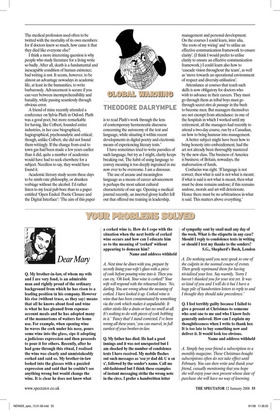THEODORE DALRYMPLE
The medical profession used often to be twitted with the mortality of its own members: for if doctors knew so much, how came it that they died like everyone else?
I think a more interesting question is why people who study literature for a living write so badly. After all, death is a fundamental and inescapable condition of human existence; bad writing is not. It seems, however, to be almost an advantage nowadays in academic life, at least in the humanities, to write barbarously. Advancement is secure if you can veer between incomprehensibility and banality, while passing seamlessly through obvious error.
A friend of mine recently attended a conference on Sylvia Plath in Oxford. Plath was a good poet, but more remarkable for having, like Colbert, founded entire industries, in her case biographical, hagiographical, psychoanalytic and critical; though, unlike Colbert, she did not found them wittingly. If the change from coal to town gas had been made a few years earlier than it did, quite a number of academics would have had to seek elsewhere for a subject. Needless to say, they would have found it.
Academic literary study seems these days to be ninth-rate philosophy, or drunken verbiage without the alcohol. I’d rather listen to my local pub bore than to a paper entitled ‘Open Ended: Poetic Closure and the Digital Interface’: ‘The aim of this paper is to read Plath’s work through the lens of contemporary hermeneutic discourse concerning the autonomy of the text and language, while situating it within recent developments in digital poetry and electronic means of experiencing literary texts.’ I have sometimes tried to write parodies of such language, but try as I might, clarity keeps breaking out. The habit of using language to convey meaning is too deeply ingrained in me now ever to be overcome. I am a dinosaur.
The use of arcane and meaningless language as a means of career advancement is perhaps the most salient cultural characteristic of our age. Opening a medical journal recently, an inserted glossy leaflet fell out that offered me training in leadership, management and personal development. On the courses I could learn, inter alia, ‘the roots of my wiring’ and ‘to utilise an effective communication framework to ensure clarity’. (I think I would prefer to utilise clarity to ensure an effective communication framework.) I could learn also how to ‘cascade vision throughout the team’, as well as ‘move towards an operational environment of respect and diversity-utilisation’.
Attendance at courses that teach such skills is now obligatory for doctors who wish to advance in their careers. They must go through them as tribal boys must go through secret rites de passage in the bush to become men. But managers themselves are not exempt from attendance: in one of the hospitals in which I worked until my retirement, all the managers had recently to attend a two-day course, run by a Canadian, on how to bring humour into management.
A better subject might have been how to bring honesty into embezzlement, had the art not already been thoroughly mastered by the new class. The business of America is business; of Britain, nowadays, the malversation of funds.
Confucius was right. ‘If language is not correct, then what is said is not what is meant; if what is said is not what is meant, then what must be done remains undone; if this remains undone, morals and art will deteriorate. Hence there must be no arbitrariness in what is said. This matters above everything.’


























































 Previous page
Previous page